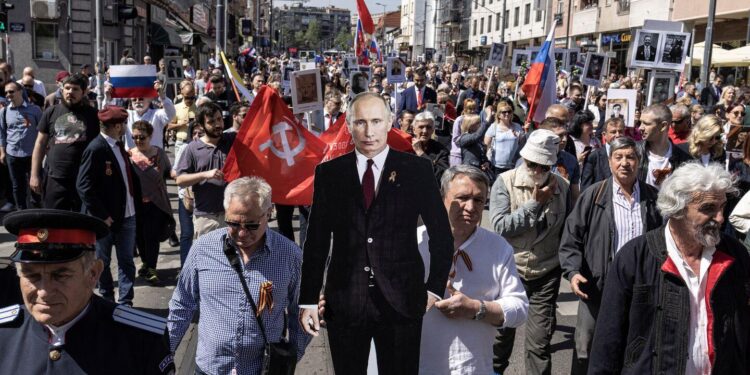As Moldova approaches its upcoming elections, concerns over foreign interference have intensified. A recent report by Recorded Future reveals a coordinated effort by Russian influence assets aimed at shaping the electoral outcome in the small Eastern European nation. The findings shed light on a complex web of information operations and strategic maneuvers designed to sway public opinion and political power, raising pressing questions about the integrity of Moldova’s democratic process.
Russian Influence Networks Target Moldovan Political Landscape Ahead of Elections
Amid the upcoming electoral cycle in Moldova, Moscow-linked actors have intensified their efforts to shape public opinion and political outcomes. These influence operations utilize a multifaceted approach combining online disinformation campaigns, strategic media placements, and covert financing of sympathetic political groups. Key social media platforms have witnessed a surge in coordinated messaging amplifying divisive narratives aimed at undermining pro-Western candidates while promoting pro-Russian sentiments. Experts highlight a sophisticated network of fake accounts, automated bots, and troll farms, all orchestrated to manipulate voter perceptions and erode trust in Moldova’s democratic institutions.
Data gathered by cybersecurity analysts outlines several critical channels through which these influence assets operate:
- State-sponsored news portals subtly aligned with Kremlin viewpoints
- Localized community forums and messaging apps spreading tailored disinformation
- Opaque funding mechanisms bolstering fringe political entities with agendas favorable to Russian interests
| Influence Vector | Modus Operandi | Impact on Electorate |
|---|---|---|
| Social Media Manipulation | Bot-driven content amplification | Polarization and voter confusion |
| Disinformation Websites | Fake news propagation | Distrust in mainstream media |
| Covert Political Funding | Financial support to proxy parties | Legitimization of pro-Russian candidates |
Tactics and Channels Used by Russian Influence Assets to Sway Voter Sentiment in Moldova
Russian influence operations in Moldova have strategically employed a diverse array of tactics to manipulate voter perceptions and deepen social divisions. Among the most prevalent methods are targeted disinformation campaigns circulated through social media platforms like Facebook and Telegram, where memes, fake news, and emotionally charged narratives are disseminated to sow distrust in democratic institutions. These digital efforts are often complemented by coordinated bot networks and troll farms that amplify misleading content, creating an illusion of widespread public support or opposition to key political figures and policies.
Offline channels have also played a critical role, including the use of local proxies and politically aligned media outlets that promote pro-Russian sentiments under the guise of independent journalism. Community events and covert funding to sympathetic political actors have further bolstered the Kremlin’s reach within Moldova’s electorate. Below is an overview of the primary tactics and channels used, alongside their operational focus areas:
| Tactic/Channel | Description | Target Audience |
|---|---|---|
| Social Media Disinformation | False narratives, manipulated images, and fake news bots | Urban youth and undecided voters |
| Political Proxies | Support for candidates aligned with Russian interests | Party loyalists and regional strongholds |
| Local Media Manipulation | State-funded outlets spreading pro-Kremlin editorials | Older demographic and rural populations |
| Community Mobilization | Events promoting cultural and historical ties to Russia | Ethnic Russian communities and sympathizers |
Experts Urge Strengthened Cybersecurity Measures and Media Literacy Programs to Counter Disinformation
In light of escalating disinformation campaigns targeting Moldova’s electoral process, experts emphasize the need for robust cybersecurity frameworks and comprehensive media literacy initiatives. Cybersecurity specialists warn that state-sponsored actors, including Russian influence groups, are exploiting vulnerabilities in digital infrastructure to disseminate false narratives and manipulate public perception. Strengthening network defenses, enhancing real-time threat detection, and fostering greater collaboration between government agencies and private sector stakeholders are critical steps advocated by cybersecurity professionals.
Concurrently, education experts call for intensified media literacy programs aimed at equipping citizens with the skills to critically analyze and verify information sources. Highlighted recommendations include:
- Integrating media literacy into school curricula across all levels
- Launching nationwide public awareness campaigns on identifying fake news
- Developing tools to flag and counter online disinformation in social media platforms
| Measure | Focus Area | Expected Outcome |
|---|---|---|
| Cybersecurity Enhancement | Infrastructure & Monitoring | Reduced influence of malicious actors |
| Media Literacy Programs | Education & Awareness | Improved public resilience to fake news |
| Cross-Sector Partnerships | Government & Private Sector | Faster identification and response |
In Summary
As Moldova approaches a pivotal moment in its democratic trajectory, the convergence of Russian influence assets underscores the intricate geopolitical stakes at play. Monitoring these dynamics remains crucial for stakeholders aiming to safeguard electoral integrity and regional stability. Recorded Future’s analysis provides a timely lens into the evolving tactics of external actors seeking to shape Moldova’s political future, highlighting the ongoing challenges faced by emerging democracies in the face of foreign interference.
















